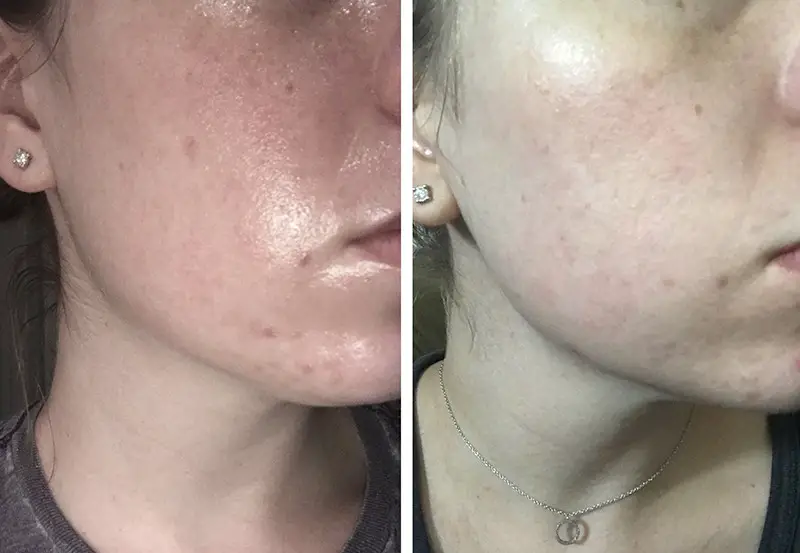
Vitamin C is a popular ingredient in skincare. Still, many people are not sure whether a vitamin C exfoliator is worth it since other well-known exfoliators are on the market, and any ingredients in exfoliators might be washed off.
Vitamin C is an excellent exfoliator that doesn’t get washed off easily but it is nowhere as absorbent in an exfoliator as it is in serum. Vitamin C works for most skin types, can tighten skin, brighten skin, thicken facial skin, prevent signs of premature aging, and treats hyperpigmentation, marks, scars, and sunburns.
Is Vitamin C an Exfoliator?
Vitamin C is a popular ingredient in many skincare products, from moisturizers to serums and even in exfoliators. However, vitamin C can work as an exfoliant, even if it is not in a product directly used for skin exfoliation.
UV rays and pollution can take a toll on your skin and make it damaged, dull, wrinkle, develop dark spots, etc.
Vitamin C is an antioxidant that neutralizes the free radicals that would attack your healthy skin cells. Vitamin C is acidic; it gets rid of dead skin cells to reveal brighter, glowing skin. This causes your skin to speed up the cell turnover rate, growing newer skin cells while shedding the dead skin cells.
Since vitamin C is very bitter and acidic, it makes the skin “heal” itself when you apply it. The “healing” process will encourage more elastin and collagen growth, making the skin plump and bouncy.
So, vitamin C can work as an exfoliant even if it is not a typical physical or chemical exfoliant. Most vitamin C serums will work similarly to chemical exfoliants. So if you already use vitamin C or a chemical exfoliant, be sure to choose one; using a chemical exfoliant and vitamin C can cause skin irritation.

Pros of Vitamin C
Youthful Skin
Vitamin C can promote youthful skin and prevent premature aging. Vitamin C stimulates collagen production, making your skin more elastic and plump (Farris et al., 2005). It can also thicken facial skin to lessen and prevent wrinkles.
A small study performed tests to see how topical vitamin C impacted the skin (Crisan et al., 2015). The researchers asked sixty participants to apply 5% vitamin C solution for six months. The participants had an increase in skin thickness. While the study was small, the study still showed a lot of promise for vitamin C and its anti-aging properties.
Age and other factors (UV exposure, smoking, dehydration, etc.) can cause the skin to sag prematurely. Vitamin C can tighten the skin by stimulating collagen production, which keeps your skin plump (Pullar et al., 2017).
Brightening Properties

UV ray exposure can speed up the aging process and create dark spots. Excessive UV ray exposure can also lead to uneven skin tone, hyperpigmentation, melasma, etc. Hormonal changes can also make the skin uneven.
According to the researchers from Linus Pauling Institute at Oregon State University, vitamin C could reduce melanin production. Melanin is a naturally occurring dark brown to black pigment that causes people to tan. While getting a tan is fine, hyperpigmentation (excessive melanin production) can cause age spots, uneven facial and body skin, etc. Regular and proper vitamin C use can reduce melanin production to help prevent hyperpigmentation while simultaneously treating it.
Additionally, vitamin C can lighten dark marks from acne and other wounds as well as help smooth out scars. As mentioned earlier, it boosts collagen production and reduces your body’s melanin production, encouraging your skin to “renew” and lighten the dark marks.
Hydration
A water-soluble derivative of vitamin C called magnesium ascorbyl phosphate can keep your skin hydrated (Telang et al., 2013). It is not as strong as ascorbic acid (found in most vitamin C serums), but it is compatible with water. It decreases transepidermal water loss, making the skin retain moisture better.
Boosts Healing
Vitamin C boosts collagen production and the skin cell turnover rate; it can speed up the healing process. For instance, the enhanced collagen production from vitamin C can help you recover from sunburn and wounds faster. Depending on the severity of your sunburn, vitamin C serums can reduce redness by accelerating skin cell turnover.
Cons of Vitamin C
Skin Irritation
Most people can tolerate vitamin C products well, but people with sensitive or dry skin may feel a slight sting when they use the products. Vitamin C is acidic, making the skin a bit red, tingly, and/or stingy after use. It would be best to use products that contain lower dosages of vitamin C if your skin feels very irritated or dry after using vitamin C. Try to choose a vitamin C concentration of 5% or less.
Even if you have normal skin, you should be wary of other skincare products you have while using vitamin C. Vitamin C with other exfoliating/potent products can irritate your skin.

For instance, you should not mix benzoyl peroxide (common acne treatment/treatment) with vitamin C. Benzoyl peroxide can oxidize vitamin C, making your vitamin C less potent. However, you can use them at different times. For example, you can use benzoyl peroxide in the morning and vitamin C serum at night.
Retinoids and vitamin C also do not mix. Vitamin C and retinoids have similar effects, so using both can over-exfoliate your skin, leading to skin irritation, redness, etc. It would be best to be cautious about using vitamin C with AHA/BHA to avoid over-exfoliation.
Sun Sensitivity
Vitamin C can repair your skin from sun damage. However, it can also make your skin more sensitive to the sun because it exfoliates, making your new skin cells more prone to hyperpigmentation. Luckily, you can avoid this by using vitamin C products at night and wearing a broad-spectrum sunscreen with SPF 30-50 every day.
What Skin Type Can Use Vitamin C?
Almost any skin type can use vitamin C. If you have dry or sensitive skin, you can choose a less potent concentration (5% or lower) to avoid irritation. If you have hypersensitive skin, you may need to avoid vitamin C altogether.
How Do I Use Vitamin C on My Skin?
Most products that contain vitamin C to “exfoliate” your skin will come as serums. Here is how to use most serums:
- After cleansing your face and applying toner (if you use it), put a few drops of vitamin C serum onto your hands.
- Rub your hands together, then gently pat the product onto your face and neck.
- Continue with the rest of your skincare routine (moisturizer, SPF, etc.).
How to Store Vitamin C Products

Vitamin C is prone to oxidation and breaking down when it does not get stored properly. Your vitamin C serum should be a light straw color or colorless; if it is not that color, you should not use it. It will not be very effective, and it can cause a slight yellow discoloration.
You should keep your vitamin C products tightly sealed in their containers. Avoid keeping it in the bathroom; the humidity and heat fluctuate a lot in the bathroom. You should also keep them away from light. You can keep your vitamin C products in the fridge or another cool, dark place where the temperature does not fluctuate.
Should I Use Vitamin C?
Overall, most skin types can benefit from vitamin C. It is especially great if your main concerns are hyperpigmentation, scarring, and aging. People with sensitive and dry skin types should use weaker vitamin C concentrations. Otherwise, vitamin C is worth it for almost anyone who wants to exfoliate their skin.


